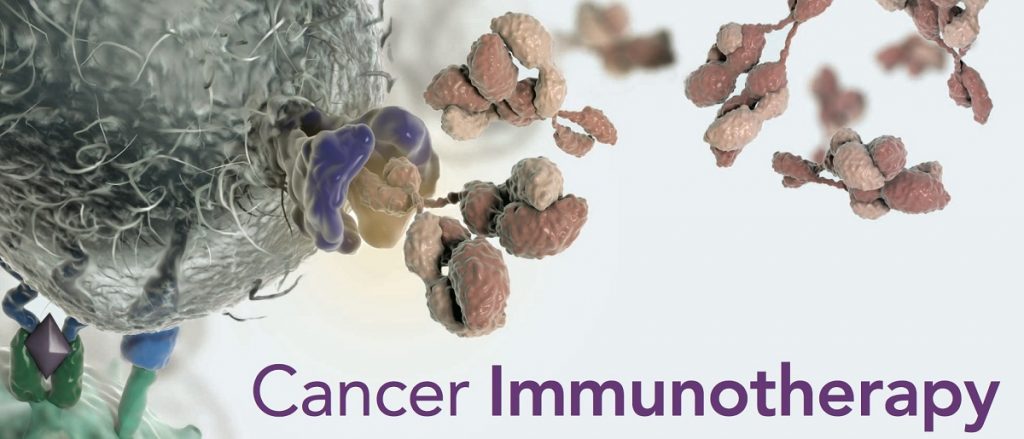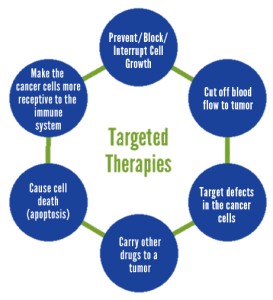Immunotherapy 
Immunotherapy is a type of cancer treatment that use the host immune system to fight cancer. The immune system is made up antibodies, white blood cells, and other chemicals and proteins that attack and destroy substances such as bacteria and viruses that they recognize as foreign and different from the body’s normal healthy tissues.
Types of Immunotherapy
There are many different types of immunotherapy used to treat cancer, which include:
- Monoclonal antibodies, which are drugs that are designed to bind to specific targets in the body. They can cause an immune responsethat destroys cancer cells. Other types of monoclonal antibodies can “mark” cancer cells so it is easier for the immune system to find and destroy them. These types of monoclonal antibodies may also be referred to as targeted therapy. See Targeted Therapy for more information.
- Adoptive cell transfer, which is a treatment that attempts to boost the natural ability of your T cellsto fight cancer. T cells are a type of white blood cell and part of the immune system. Researchers take T cells from the tumor. They then isolate the T cells that are most active against your cancer or modify the genes in them to make them better able to find and destroy your cancer cells. Researchers then grow large batches of these T cells in the lab.
- Cytokines, which are proteins that are made by your body’s cells. They play important roles in the body’s normal immune responses and also in the immune system’s ability to respond to cancer. The two main types of cytokines used to treat cancer are called interferons and interleukins.
- Treatment Vaccines, which work against cancer by boosting your immune system’s response to cancer cells. Treatment vaccines are different from the ones that help prevent disease.
- BCG, which stands for Bacillus Calmette-Guérin, is an immunotherapy that is used to treat bladder cancer. It is a weakened form of the bacteriathat causes tuberculosis. When inserted directly into the bladder with a catheter, BCG causes an immune response against cancer cells. It is also being studied in other types of cancer.
How Immunotherapy Works against Cancer
One reason that cancer cells thrive is because they are able to hide from your immune system. Certain immunotherapies can mark cancer cells so it is easier for the immune system to find and destroy them. Other immunotherapies boost your immune system to work better against cancer.
Immunotherapy Can Cause Side Effects
Immunotherapy can cause side effects, which affect people in different ways. The side effects you may have and how they make you feel will depend on how healthy you are before treatment, your type of cancer, how advanced it is, the type of therapy you are getting, and the dose. Doctors and nurses cannot know for certain how you will feel during treatment.
The most common side effects are skin reactions at the needle site. These side effects include:
- Pain
- Swelling
- Soreness
- Redness
- Itchiness
- Rash
You may have flu-like symptoms, which include:
- Fever
- Chills
- Weakness
- Dizziness
- Nauseaor vomiting
- Muscle or joint aches
- Fatigue
- Headache
- Trouble breathing
- Low or high blood pressure
Other side effects might include:
- Swelling and weight gain from retaining fluid
- Heart palpitations
- Sinus congestion
- Diarrhea
- Risk of infection
Immunotherapies may also cause severe or even fatal allergic reactions. However, these reactions are rare.
How Immunotherapy Is Given
Different forms of immunotherapy may be given in different ways. These include:
- Intravenous (IV)
The immunotherapy goes directly into a vein. - Oral
The immunotherapy comes in pills or capsules that you swallow. - Topical
The immunotherapy comes in a cream that you rub onto your skin. This type of immunotherapy can be used for very early skin cancer. - Intravesical
The immunotherapy goes directly into the bladder.
How Often You Will Receive Immunotherapy Treatment
How often and how long you receive immunotherapy depends on:
- Your type of cancer and how advanced it is
- The type of immunotherapy you get
- How your body reacts to treatment
You may have treatment every day, week, or month. Some immunotherapies are given in cycles. A cycle is a period of treatment followed by a period of rest. The rest period gives your body a chance to recover, respond to the immunotherapy, and build new healthy cells.
What immunotherapy clinical trials are available for me?
Many other immunotherapies are being studied in clinical trials, which are research studies involving people. To find a study that may be an option for you, visit Find a Clinical Trial.
Resources:
